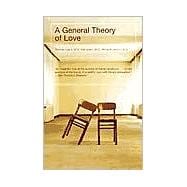
A General Theory of Love
by Lewis, Thomas; Amini, Fari; Lannon, RichardBuy New
Buy Used
Rent Book
eBook
We're Sorry
Not Available
How Marketplace Works:
- This item is offered by an independent seller and not shipped from our warehouse
- Item details like edition and cover design may differ from our description; see seller's comments before ordering.
- Sellers much confirm and ship within two business days; otherwise, the order will be cancelled and refunded.
- Marketplace purchases cannot be returned to eCampus.com. Contact the seller directly for inquiries; if no response within two days, contact customer service.
- Additional shipping costs apply to Marketplace purchases. Review shipping costs at checkout.
Summary
Author Biography
Table of Contents
| Preface | vii | ||||
|
3 | (13) | |||
|
16 | (19) | |||
|
35 | (31) | |||
|
66 | (34) | |||
|
100 | (21) | |||
|
121 | (24) | |||
|
145 | (20) | |||
|
165 | (26) | |||
|
191 | (36) | |||
|
227 | (4) | |||
| Notes | 231 | (10) | |||
| Bibliography | 241 | (14) | |||
| Acknowledgments | 255 | (6) | |||
| Index | 261 |
Excerpts
Answering these questions, laying bare the heart's deepest secrets, is this book's aim. Since the dawn of our species, human beings in every time and place have contended with an unruly emotional core that behaves in unpredicted and confusing ways. Science has been unable to help them. The Western world's first physician, Hippocrates, proposed in 450 B.C. that emotions emanate from the brain. He was right-but for the next twenty-five hundred years, medicine could offer nothing further about the details of emotional life. Matters of the heart were matters only for the arts-literature, song, poetry, painting, sculpture, dance. Until now.
The past decade has seen an explosion of scientific discoveries about the brain, the leading edge of a revolution that promises to change the way we think about ourselves, our relationships, our children, and our society. Science can at last turn its penetrating gaze on humanity's oldest questions. Its revelations stand poised to shatter more than a few modern assumptions about the inner workings of love.
Traditional versions of the mind hold that Passion is a troublesome remnant from humanity's savage past, and the intellectual subjugation of emotion is civilization's triumph. Logical but dubious derivations follow: emotional maturity is synonymous with emotional restraint. Schools can teach children missing emotional skills just as they impart the facts of geometry or history. To feel better, outthink your stubborn and recalcitrant heart. So says convention.
In this book, we demonstrate that where intellect and emotion clash, the heart often has the greater wisdom. In a pleasing turnabout, science-Reason's right hand-is proving this so. The brain's ancient emotional architecture is not a bothersome animal encumbrance. Instead, it is nothing less than the key to our lives. We live immersed in unseen forces and silent messages that shape our destinies. As individuals and as a culture, our chance for happiness depends on our ability to decipher a hidden world that revolves-invisibly, improbably, inexorably-around love.
From birth to death, love is not just the focus of human experience but also the life force of the mind, determining our moods, stabilizing our bodily rhythms, and changing the structure of our brains. The body's physiology ensures that relationships determine and fix our identities. Love makes us who we are, and who we can become. In these pages, we explain how and why this is so.
During the long centuries when science slumbered, humanity relied on the arts to chronicle the heart's mysterious ways. That accumulated wisdom is not to be disdained. This book, while traveling deep into the realm of science, keeps close at hand the humanism that renders such a journey meaningful. The thoughts of researchers and empiricists join those of poets, philosophers, and kings. Their respective starting points may be disparate in space, time, and temperament, but the voices in this volume rise and converge toward a common goal.
Every book, if it is anything at all, is an argument: an articulate arrow of words, fledged and notched and newly anointed with sharpened stone, speeding through paragraphs to its shimmering target. This book-as it elucidates the shaping power of parental devotion, the biological reality of romance, the healing force of communal connection-argues for love. Turn the page, and the arrow is loosed. The heart it seeks is your own.
From the Hardcover edition.
Excerpted from A General Theory of Love by Thomas Lewis, Fari Amini, Richard Lannon
All rights reserved by the original copyright owners. Excerpts are provided for display purposes only and may not be reproduced, reprinted or distributed without the written permission of the publisher.
An electronic version of this book is available through VitalSource.
This book is viewable on PC, Mac, iPhone, iPad, iPod Touch, and most smartphones.
By purchasing, you will be able to view this book online, as well as download it, for the chosen number of days.
Digital License
You are licensing a digital product for a set duration. Durations are set forth in the product description, with "Lifetime" typically meaning five (5) years of online access and permanent download to a supported device. All licenses are non-transferable.
More details can be found here.
A downloadable version of this book is available through the eCampus Reader or compatible Adobe readers.
Applications are available on iOS, Android, PC, Mac, and Windows Mobile platforms.
Please view the compatibility matrix prior to purchase.
